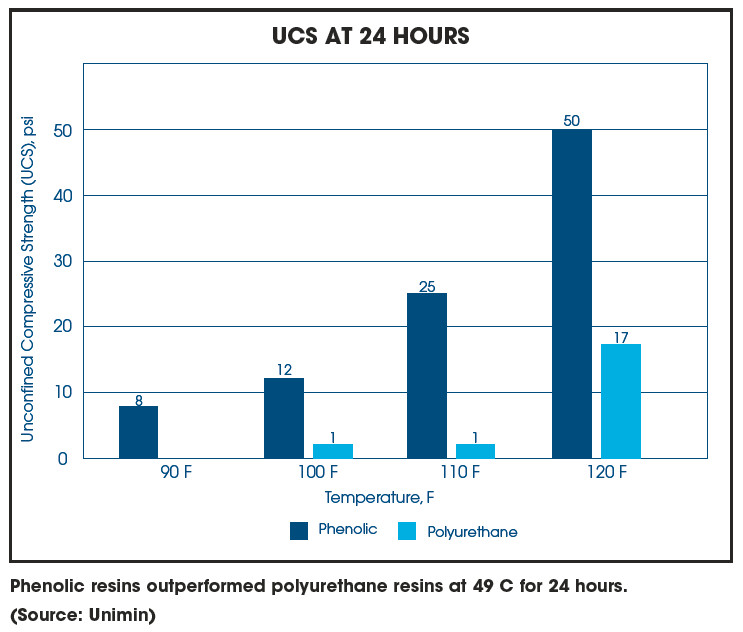With safety and environmental compliance assured, the financial success of a well is measured in terms of high IP rates and excellent EURs. Lateral length, stage size and proppant volumes are all credited with producing a great well. However, the resin-coated sand that was pumped at the end of each stage to help control sand flowback is what’s usually forgotten. A lot of time, money and effort are put into designing and completing the well, so the least that can be done is to make sure that the proppant (and all that hard work) actually stays in the fractures.
Curable resin-coated sand is not new. Products are widely available to help prevent proppant flowback as long as reservoir conditions are at 66 C (150 F) or greater. Plays with temperatures lower than 66 C, specifically in the Permian, require a chemical activator to start the bonding process downhole. Being able to eliminate the use of a chemical activator can provide a safer, cleaner and simpler operation.
Being able to eliminate the use of a chemical activator can provide a safer, cleaner and simpler operation.
The Permian requires high-quality curable resin-coated sand that is able to reliably bond at temperatures lower than 66 C without the use of a chemical activator. To achieve that, Unimin Oil and Gas Solutions, a member of the Sibelco Group, has released PROPSTAR CRYOSET, a low-temperature resin-coated product (RCP) consistent in quality and performance.
Product development
In the beginning development stages of the product, criteria were established. Obviously all American Petroleum Institute (API) requirements would need to be met along with comparable conductivity numbers to the already high-quality PROPSTAR ELITE RCP. The only option to achieve this would be to coat on premium northern white sand, the exceptional substrate that provides the base for a high-performing RCP. The final piece that needed to be determined was down to what temperatures the product would provide flowback control. As job sizes increase, the amount of surface temperature fracture fluid also will increase. Pumping millions of gallons of 21 C (70 F) fluid into a reservoir that is 49 C (120 F) will have a significant cooling effect. Coupling with the understanding that there are reservoirs with temperatures cooler than 49 C, it was critical that PROPSTAR CRYOSET RCP be able to bond down to at least 32 C (90 F).
When looking at different resins that could be utilized, two main systems were evaluated: polyurethane- and phenolic- based resins. Both have their own unique properties, and multiple plant trials were conducted for each system. Both resins meet and exceed API RP 19C and 19D testing from third-party testing facilities and Unimin’s own internal laboratory. Roundness, sphericity, crush strength and conductivity were all exceptional. But what about each resin’s ability to provide flowback control? For that, unconfined compressive strength (UCS) testing needed to be completed.
The first system trialed was a polyurethane system. Unimin ran multiple plant trials partnering with a leading urethane supplier. Every time the results were similar. Bonding could be achieved at 49 C for 24 hours, but at lower temperatures polyurethane proved to be unreliable. On rare occasions a core with compressive strength exceeding 25 psi could be formed at 38 C (100 F), but bonding was never observed at 32 C.
The other issue found with this system, regardless of temperature, was the 24 hours shut-in time required. At 49 C for 12 hours no bonding could be obtained. Operators want to start flowing their wells back as soon as possible, and being required to wait at least 24 hours can be problematic. Recognizing the product’s objectives and realizing the polyurethane’s limitations, this resin system was not robust enough.

Plant trials with a phenolic-based resin also were conducted on multiple instances. Excellent UCS results were accomplished with every batch, every grade, every time. The industry standard, 25 psi, is achieved at 49 C in just 4 hours. On average 50 psi is achieved for the 24-hr test. Extensive UCS testing was conducted at 32 C to ensure that the product would be able to regularly provide flowback control. Not only was it found that PROPSTAR CRYOSET RCP was able to form a UCS core, but it was able to provide resistance when being crushed. Similar performance was seen at 38 C and 43 C (110 F). Scanning electron microscope images of the UCS cores were taken to ensure that the product was in fact bonding and that the resin connected the grains to prevent flowback while still maintaining porosity to allow the production of hydrocarbons. When the visual representation of the pack was paired with actual conductivity numbers, crush strength and consistent UCS results over a wide range of temperatures, the search for PROPSTAR CRYOSET RCP was over. The Permian Basin officially has a solution for a high-performing exceptional quality low-temperature product.

Advantages
Using PROPSTAR CRYOSET RCP for low-temperature wells to ensure flowback control has numerous advantages. Being able to keep the proppant in formation can minimize workovers later on in the well’s life. Increased duration of artificial lift equipment and pumps is due to a reduction in sand abrasion. Most importantly, sand in formation allows more oil and gas to be produced, increasing EUR.
Recommended Reading
Kimmeridge Fast Forwards on SilverBow with Takeover Bid
2024-03-13 - Investment firm Kimmeridge Energy Management, which first asked for additional SilverBow Resources board seats, has followed up with a buyout offer. A deal would make a nearly 1 Bcfe/d Eagle Ford pureplay.
Laredo Oil Subsidiary, Erehwon Enter Into Drilling Agreement with Texakoma
2024-03-14 - The agreement with Lustre Oil and Erehwon Oil & Gas would allow Texakoma to participate in the development of 7,375 net acres of mineral rights in Valley County, Montana.
Hess Corp. Boosts Bakken Output, Drilling Ahead of Chevron Merger
2024-01-31 - Hess Corp. increased its drilling activity and output from the Bakken play of North Dakota during the fourth quarter, the E&P reported in its latest earnings.
The OGInterview: Petrie Partners a Big Deal Among Investment Banks
2024-02-01 - In this OGInterview, Hart Energy's Chris Mathews sat down with Petrie Partners—perhaps not the biggest or flashiest investment bank around, but after over two decades, the firm has been around the block more than most.
Petrie Partners: A Small Wonder
2024-02-01 - Petrie Partners may not be the biggest or flashiest investment bank on the block, but after over two decades, its executives have been around the block more than most.





